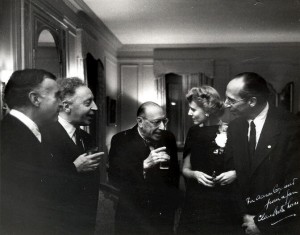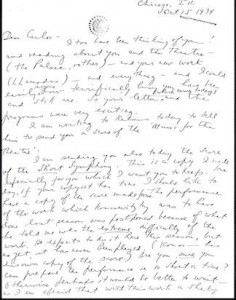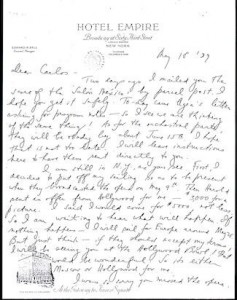El Salon Mexico was a highly labored over composition Copland was particularly enthusiastic about writing. Spending over two years on its composition, Copland was in correspondence with Mexican composer Carlos Chavez years before its actual premiere in the Fall of 1937. The correspondence between Copland and Chavez reveals Copland’s strong interest in the pieces reception critically both in terms of popularity but also particularly centered on the acceptance of it as Mexican music.
Copland’s enthusiasm for the piece can be seen in his letter two years before its premiere in a letter from August 28th, 1935:
“Just now I am finishing up the orchestration of El Salon Mexico which I wrote you about last summer. What it would sound like in Mexico I can’t imagine, but everyone here for whom I have played it seems to think it is very gay and amusing!”
This quote reveals both the excitement Copland felt and also his concern over the piece’s reception in Mexico. This concern is more strongly articulated in other letters he wrote to Chavez during the piece’s composition. In October 1934 he wrote that:
“I am terribly afraid of what you will say of he Salon Mexico – perhaps it is not Mexican at all and I would look so foolish. But in America del Norte it may sound Mexican!”
Anxious to hear about the reception of the piece, Copland asked explicitly for Chavez to pass on that information to him in 1937 after he sent the piece to be performed. He writes:
“I hope the Festival will be a big success. Also, that you’ll enjoy working on the Salon Mexico. Be sure to have Armando send me all the reviews – even those of Senor Pollares!”
The correspondence between Copland and Chavez provides a fascinating insight into the concerns and enthusiasm that Copland had over the piece and shows that Copland himself was very consciously thinking about the issues of race and musical representation during the composition of his piece. Some interesting questions to ask would be whether or not Copland ought to be writing pieces which he worries are “authentic” only to an audience they do not belong to. Is it reinforcing racial stereotypes if the culture wildly raving the piece as “Mexican” is America? Is Copland advocating the writing of stereotyped pieces? Or is he trying to authentically capture and represent what might constitute as “Mexican music?” Would doing so be a respectful celebration or appropriation of Mexican music? Is Copland’s correspondence with Chavez reveal a genuine desire to please Mexican audiences or to market to American audiences? These are all questions without answers, because that’s what this class is about.
Works Cited:
Kostelanetz, Richard. Aaron Copland: A Reader. Great Britain: Routledge, 2004. Print.
http://lcweb2.loc.gov/diglib/ihas/loc.natlib.copland.phot0005/default.html



